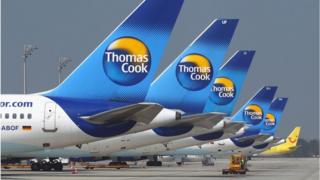Airline collapse rules could be changed so planes can fly people home

Image copyright
Getty Images
Planes owned by failed airlines could to be used to repatriate passengers – instead of being immediately grounded – under government plans.
Proposed legislation would enable collapsed carriers to be placed into “special administration”, it said.
This would mean aircraft and crew could continue flying in the short-term.
Under the existing system, the grounding of planes when an airline goes bust leaves passengers at risk of being stranded.
When the government wanted to bring Thomas Cook customers back to the UK after the travel firm collapsed in September, it had to ask the Civil Aviation Authority (CAA) to get hold of 150 aircraft from around the world.
The regulator operated nearly 700 flights at a cost of £100m, in effect by building a shadow airline.
Even though some passengers were not Atol-protected – meaning they would not have been eligible to automatically claim the cost of an alternative flight – the decision was taken to try to repatriate everyone and avoid people being stranded abroad, or facing long waits to get home.
The proposed legislation would allow the CAA to use an airline’s existing infrastructure, planes and staff to bring people back, which has not previously been allowed by the UK’s insolvency laws.
The government said that this would mean less disruption and would cost taxpayers less.
Analysis
By BBC business reporter Howard Mustoe
When a company goes under, any assets it rents – like planes – will be seized by their owners. The rest of the firm’s belongings will be auctioned off to pay off creditors, such as bond investors and banks. In other words, there’s always someone who has a claim to the airplanes of a bust airline.
Borrowing the hardware for a short period to bring passengers home makes perfect sense, and makes thing much easier for the government.
To rescue Thomas Cook’s passengers they needed to cobble together a short-term fleet, and do so quietly to avoid causing a panic and turning the company’s likely demise into a certainty.
But this new plan does mean making the planes’ owners wait a bit before they get them back.
The recommendation of “keeping the fleet flying” is from a review into airline insolvency published in May this year which looked into the protections available to air passengers.
Transport Secretary Grant Shapps said: “We’ve seen recently the huge impact airlines collapsing can have on passengers and staff.
“To bring over 140,000 Thomas Cook passengers home, the government and UK CAA worked together round the clock and, with the support of people across the globe, carried out the biggest peacetime repatriation exercise in UK history.
“I’m determined to bring in a better system to deal with similar situations in future, helping ensure passengers are protected and brought home quickly and safely.
The report also recommended the introduction of a 50p levy per air fare to cover the cost of bringing UK passengers home when an airline goes bust.

